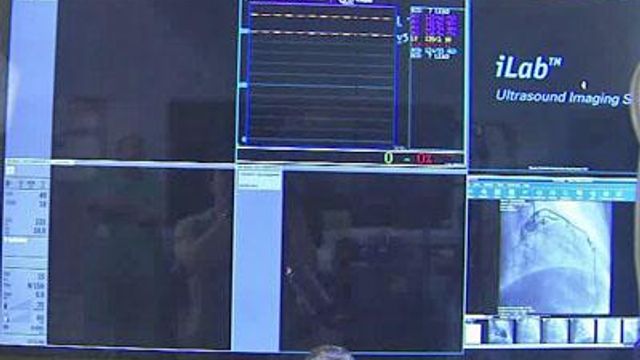New cath lab equipment helps reduce radiation risk at Rex
Diagnosing and treating heart disease involves one of the most common procedures performed in hospitals: catheterization. It exposes the patient to radiation and contrast dye that can be hard on the kidneys.
Posted — UpdatedCatheterization involves threading a tube through a major artery or a person's bladder. It exposes the patient to radiation and contrast dye that can be hard on the kidneys.
Rex Hospital Cardiac Catherization labs stay busy with patients who've experienced a heart attack or chest pains.
Once interventional cardiologist Dr. Deepak Pasi threads a catheter through a major artery in the leg or the wrist, his eyes are on different screens to help him find blockage or narrowing in the heart arteries.
He used to have four screens on which to view different images. Now, he has one high-definition screen with six images that he can move around.
There's an electrocardiograph image to monitor the heart, an ultrasound screen, two screens with still images of the heart and another to look at film from a patient's previous procedure.
Pasi said the high-definition screen makes it easier on the physician. Because of the multiple images, he said, he doesn't need to take as many X-rays, which means less radiation for the patient.
A new swinging X-ray arm captures images in motion, instead of taking stationary film.
“You can see a picture of it from all different directions,” Pasi said.
The devices mean less contrast dye is needed to see bloodflow, which creates less stress on the kidneys.
“You’ve done the case with about 20 cc’s of contrast, which normally would take close to 100 cc's,” Pasi said.
Pasi said the new high-definition screen also offers more detailed images, which is important with more obese patients. X-rays don't penetrate their fat as well, but the high-def image might keep doctors from dialing up the radiation dose.
• Credits
Copyright 2024 by Capitol Broadcasting Company. All rights reserved. This material may not be published, broadcast, rewritten or redistributed.





